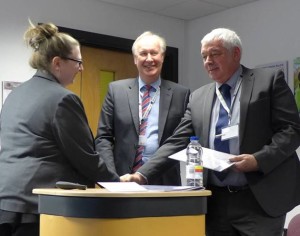Training organisation RTITB celebrated the launch of its new LGV Driver Training Standard at its headquarters in Telford.

It outlined the aims of the scheme at a launch event last week: to provide a consistent high standard of training for drivers, as well as to help tackle the driver shortage.
The RTITB Driver Training Standard is based on the four modules needed to acquire a vocational LGV licence. The training programme is made up of a series of detailed instructor guides and training resources.
RTITB’s managing director Laura Nelson said that the organisation aims to have 40 companies involved with the programme in the first year – and training must be either by RTITB or DVSA instructors. She added that the organisation wants RTITB trained drivers to be held in the same esteem as the ‘Red Tractor’ quality mark is for food standards.
Denby Transport, the first organisation to be approved as meeting the new LGV Driver Standard criteria, was presented with a certificate at the launch.
RTITB has said it hopes to have an overall first time pass rate of 75 per cent; 20 per cent higher than the existing national average.
The speakers at the event discussed the importance of quality training and its role in creating a more professional industry that is more likely to attract young people and new talent.
Speakers at the launch included: John Bowman, JohnB Consulting,; Mike Williams, RTITB chairman; Nick Jones, traffic commissioner for Wales and the West Midlands; Mick Skerrett CMILT, driver development manager at Manpower UK; Andy Frost, director of Merlin Supply Chain Solutions; Stuart Gaunt, MAN Truck and Bus UK; and Steve Reynolds, transport manager at Maritime Transport.
RTITB chairman Mike Williams said that new scheme is also a way to address the problem of good quality LGV trainers being undercut on price by poor quality trainers.
Laura Nelson said that the scheme provides an opportunity for a traditionally “ ‘clositive’ industry” to share and exchange to tackle the driver shortage. She said that insurance companies “ want data” – and that the industry should start working together to retrieve this data.






